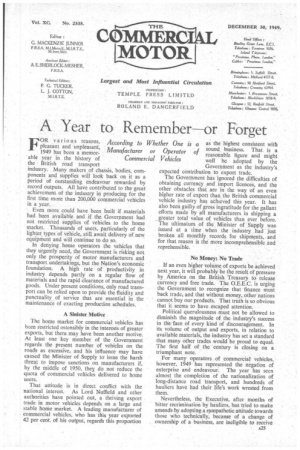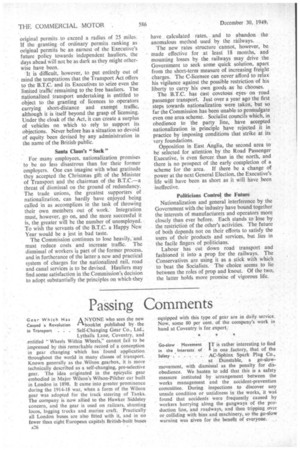A Year to Remember or Forget
Page 27

Page 28

If you've noticed an error in this article please click here to report it so we can fix it.
According to Whether One is a Manufacturer or Operator of Commercial Vehicles FOR vario us reasons, pleasant and unpleasant, 1949 has been a memorable year in the history of the British road transport industry. Many makers of chassis, bodies, components and supplies will look back on it as a period of outstanding endeavour rewarded by record outputs. All have contributed to the great achievement of the industry in producing for the first time more than 200,000 commercial vehicles in a year. Even more could have been built• if materials had been available and if the Government had not restricted supplies of vehicles to the home market. Thousands of users, particularly of the lighter types of vehicle, still await delivery of new equipment and will continue to do so.
In denying home operators the vehicles that they urgently need, the Government is risking not only the prosperity of motor manufacturers and transport undertakings, but the Nation's economic foundation. A high rate of productivity in industry depends partly on a regular flow of materials and the rapid Clearance of manufactured goods. Under present conditions, only road transport can be relied upon to provide the fluidity_ and punctuality of service that are essential in the maintenance of exacting production schedules.
A Sinister Motive The home market for commercial vehicles has been restricted ostensibly in the interests of greater exports, but there may have been another motive. At least one key member of the Government regards the present number of vehicles on the roads as excessive, and his influence may have caused the Minister of Supply to issue the harsh threat to impose sanctions on. manufacturers if, by the middle of 1950, they do not reduce the quota of commercial vehicles delivered to home users.
That attitude is in direct conflict with the national interest. As Lord Nuffield and other authorities have pointed out, a thriving export trade in motor vehicles depends on a large and stable home market. A leading manufacturer of commercial vehicles, who has this year exported 42 per cent, of his output, regard's this proportion as the highest consistent with sound business. That is a reasonable figure and might well be adopted by the Government as the industry's expected contribution to export trade.
The Government has ignored the difficulties of obtaining currency and import licences, and the other obstacles that are in the way, of an even higher rate of export than the British commercial vehicle industry has achieved this year. It has also been guilty of gross ingratitude for the gallant efforts made by all manufacturers in shipping a _ greater total value of vehicles than ever before. The ultimatum of the Minister of Supply was• issued at a time when the industry had just broken all monthly records for shipments, and for that reason is thel more incomprehensible and reprehensible.
No Money:. No Trade If an even higher volume of exports be achieved next year, it will probably be the result of pressure by America on the British Treasury to release currency and free trade. The 0.E.E.C. is urging the Government to recognize that finance must back trade, and that without money, other nations cannot buy our products. That truth is so obvious that it seems to have escaped attention.
Political querulousness must not be allowed to diminish the magnitude of the industry's success in the face of every kind of discouragement. In its volume of output and exports, in relation to available materials, the industry has set a standard that many other trades would be proud to equal. The first half of the century is closing on a triumphant note.
For many operators of commercial vehicles, however, 1949 has represented the negation of enterprise and endeavour. The year has seen almost the completion of the nationalization of long-distance road transport, and hundreds of hauliers have had their lifes work wrested from them.
Nevertheless, the Executive, after months of bitter recrimination by hauliers, has tried to make amends hy adopting a sympathetic attitude towards those who technically, because of a change of ownership of a business, are ineligible to receive original permits to exceed a radius of 25 miles. If the granting of ordinary permits ranking as original permits be an earnest of the Executive's future policy towards independent hauliers, the days ahead will not be as dark as they might otherwise have been.
it is difficult, however, to put entirely out of mind the temptations that the Transport Act offers to the B.T.C. and its Executives to seize even the limited traffic" remaining to the free hauliers. The nationalized transport undertaking is entitled to object to the granting of licences to operators carrying short-distance and exempt .traffic, although it is itself beyond the grasp of licensing. Under the cloak of the Act, it can create a surplus of vehicles on which to rely to support its objections. Never before has a situation so devoid of equity been devised by any administration in the name of the British public.
Santa Claus's "Sack" • For many employees, nationalization promises to be no less disastrous than for their former employers. One can imagine with what gratitude they accepted the Christmas gift of the Minister of Transport and the chairman of the B.T.C.—a threat of dismissal on the ground of redundancy. The trade unions, the greatest supporters of nationalization, can hardly have enjoyed being called in as accomplices in the task of throwing their own members out of work. Integration must, however, go on, and the more successful it is, the greater will be the number of unemployed. To wish the servants of the B.T.C. a Happy NewYear would be a jest in bad taste.
The Commission continues to lose heavily, and must reduce costs and increase traffic. The dismissal of workers is part of the former process, and in furtherance of the latter a new and practical system of charges for the nationalized rail, road and canal services is to be devised. Hauliers may find some satisfaction in the Commission's decision to adopt substantially the principles on which they have calculated rates, and to abandon the anomalous method used by the railways. The new rates structure cannot, however, be made effective for at least 18 months, and mounting losses by the railways may drive the Government to seek some quick solution, apart from the short-term measure of increasing freight charges. The C-licensee can never afford to relax his vigilance against the possible restriction of his liberty to carry his own goods as he chooses. The B.T.C. has cast covetous eyes on road passenger transport. Just over a year ago the first • steps towards nationalization were taken, but so far the Commission has been unable to promulgate even one area scheme. Socialist councils which, in obedience to the party line, have accepted nationalization in principle have rejected it in practice by imposing conditions that strike at its very foundations. Opposition in East Anglia, the second area to be selected for attention by the Road Passenger Executive, is even fiercer than in the north, and there is no prospect of the early completion of a scheme for the area. If there be a change of power at the next General Election, the Executive's life will have been as short as it will have been ineffective.
Politicians Control the Future Nationalization and general interference by the Government with the industry have bound together the interests of manufacturers and operators more closely than ever before. Each stands to lose by the restriction of the other's activities. The future of both depends not on their efforts to satisfy the users of their products and services, but lies in the facile fingers of politicians. Labour has cut down road transport and fashioned it into a prop for the railways. The Conservatives are using it as a stick with which to beat the Socialists. The choice seems to lie between the roles of prop and knout. Of the two, the latter holds more promise of vigorous life.




















































































